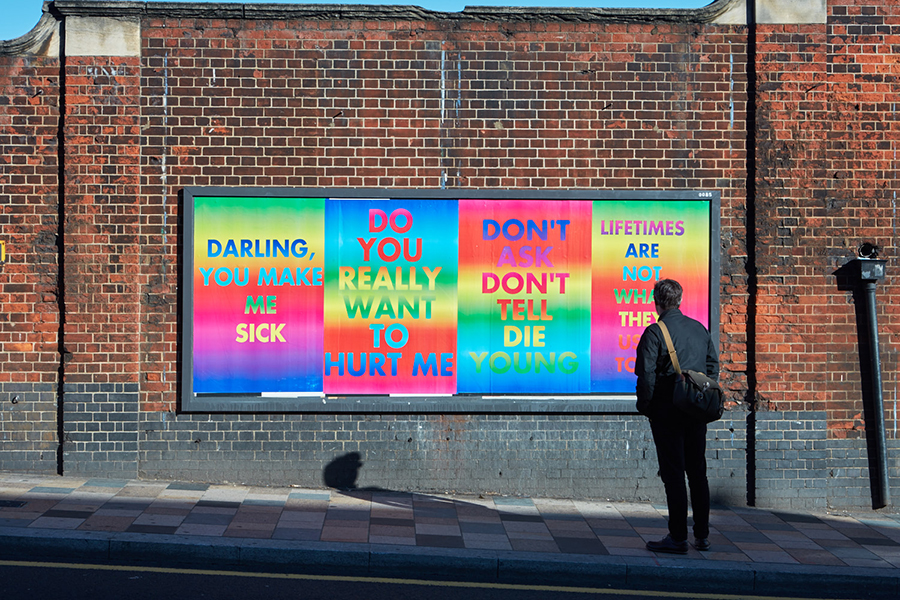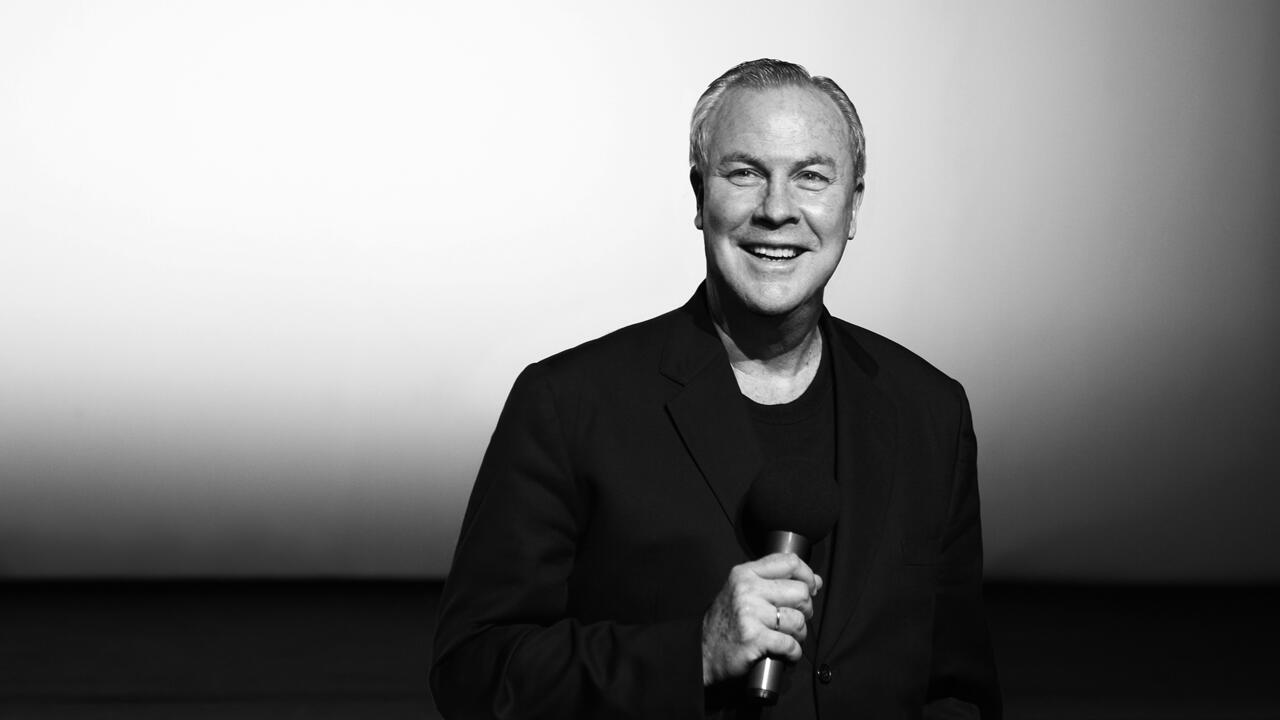Why We Painted Over David McDiarmid’s ‘I’m Too Sexy To Have AIDS’ Posters
When confronted with a deeply damaging past, it becomes necessary to take action to return us to the present
When confronted with a deeply damaging past, it becomes necessary to take action to return us to the present

On 6 October 2018, ACT UP London activists, campaigning against stigma and government inaction surrounding HIV, subverted two posters by the late artist David McDiarmid, placed in Soho, London as part of a Studio Voltaire project.
Our action was a response to the decontextualized, uncaptioned placement of the artist’s ‘Rainbow Aphorisms’ posters, one of which reads: ‘I’M TOO SEXY TO HAVE AIDS’. Instead, we painted over the message, so that it read: ‘I’M TOO SEXY AND I HAVE HIV’.

Why did we do it? The morning after the posters went up around town, ACT UP London’s phones and email inbox went into overdrive. ‘What the f*ck is this about?’, ‘I've seen people ripping the posters down and I am wondering what to do’, ‘I’m recently diagnosed and these posters make me feel sh*t’, and many other responses filled our orbit. We held an emergency meeting and welcomed those in distress to share their thoughts. We came up with a range of responses and concluded that subverting two posters fly-posted on a Soho bus stop, to contextualize the ongoing need for HIV art-activism and community empowerment, would be the best way forward – we reached for our stencils.
Justifying the action, ACT UP London activist Dani Singer later argued that medical, societal and cultural shifts since the poster was first produced meant that it now affirmed ‘stigmatizing opinions still held by many within the LGBT+ community and beyond, that having HIV in some way makes a person lesser, less sexually desirable, or less attractive.’
In an op-ed published on frieze.com on 15 October, titled ‘Activists’s Subversion of ‘I’m Too Sexy To Have AIDS’ Slogan Does Queer History a Disservice’, writer Paul Clinton objected to the posthumous alteration of the artist’s work, arguing: ‘with the best of intentions ACT UP London members risk misrepresenting the work and the often complicated, not always comfortable, history of the crisis.’ ‘Surely,’ Clinton wrote, ‘the task is to remember where we were, whilst also drawing attention to the gains we have made.’ In our opinion, the change to the poster preserved the humour of McDiarmid’s original work, whilst providing a clear, relevant and supportive message for those still affected by HIV today.

People are still dying of HIV stigma due to the structural oppression we face in this brutal political climate: cuts to HIV services, the breakdown of the NHS and the ‘hostile environment’ that targets the most vulnerable in our community such as HIV+ migrants. We honoured the ACT UP legacy of ‘Remember the dead – fight for the living.’
We have always been clear about the nature of our objection. It was never with the work of McDiarmid, but with the lack of context surrounding its placement in a public area, to be viewed by the whole of society, not just those with a particular (and fairly niche) interest in the art history concerning HIV/AIDS.
Since the action the focus has shifted, and now centres on the chasm which seems to have emerged between certain voices from ‘the art world’, and the lived reality of those affected by HIV who got in touch with us. This is reinforced by the response from Clinton on frieze.com, which also reflects the positions of many artists and others working in the arts who have posted their objections and outrage liberally on social media and elsewhere.

A counter-example that Clinton raises uses the example of artist group Gran Fury’s criticism of General Idea: the former objected to the latter’s public art project Imagevirus (1987–ongoing) which took Robert Indiana’s iconic ‘LOVE’ logo and replaced it with the word ‘AIDS’. In turn, Gran Fury transformed ‘LOVE’ into ‘RIOT’, posting it across streets in New York. Their action allowed two ideas to sit side by side, rather than cancelling the other out. Gran Fury are enormous icons to ACT UP London – their wit, sass, solidarity and transcendentally empowering messages offer a huge positive legacy. However, we are not Gran Fury, we are ACT UP London, and 20 years since they existed, we stand on our two feet in our own political ecosystem. We know that finding a HIV/AIDS healthcare for all in our lifetime is too risky to leave up to the government or the establishment. That’s why the battle also starts within ourselves.
ACT UP London has been in touch with Studio Voltaire over the years, including some of our art-ivists curating some incredible work together. We honour their explicit commitment to self-reflection and knew that our small artistic-response wouldn’t hurt their egos. The need for an action erupted on a Friday night and so we took to the streets. We were talking again come Monday. You can read Studio Voltaire’s letter in response to our action in full here.
Consider J, a queer artist living with HIV, who we spoke to prior to writing this piece (J asked to remain anonymous owing to fear of stigmatization because of his HIV status). He told us that ‘the overwhelming narrative of HIV and AIDS is predominantly based in the past – this makes the lives of people living with HIV more difficult than it needs to be.’ The work of ACT UP London attests to this. From staging events such as an ‘HIV Blind Date’ to demonstrate that people living with HIV deserve to find love, to fighting for advancements in HIV prevention and treatment to be readily available to all who need it, we are continually battling against an outdated narrative – one which Studio Voltaire’s McDiarmid poster project perpetuates – through the presentation of the messaging of the past as an integral part of the culture of the present.

J told us, ‘the moment a historical work of art is taken out of its context […] taken from a gallery, posted on the streets of London, given no explanation – it ceases to be a historical work of art. It is current, and it is political.’ When that current, political message drags us back to a deeply powerful and damaging past, and holds us there, it becomes necessary to take action to return us to the present.
Thankfully, a lot has changed for the better since ‘Rainbow Aphorisms’ was created at the height of the AIDS epidemic almost 25 years ago. In another of his ‘Rainbow Aphorisms’ works produced in 1994, McDiarmid demands ‘a future that lives up to my past.’ In ACT UP London, we believe that is something to live by: we remember the dead and fight for the living, and we will continue until that future is realized for all people affected by HIV alive today.
This article was amended 31 October 2018 at the request of ACT UP London.
Main image: One of David McDiarmid’s ‘Rainbow Aphorisms’ posters, 1993–95, amended by ACT UP, London, 2018. Courtesy: ACT UP





















